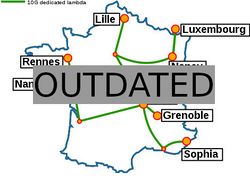Grid5000:Home: Difference between revisions
No edit summary |
No edit summary |
||
| (3 intermediate revisions by 2 users not shown) | |||
| Line 4: | Line 4: | ||
|bgcolor="#f5fff5" style="border:1px solid #cccccc;padding:1em;padding-top:0.5em;"| | |bgcolor="#f5fff5" style="border:1px solid #cccccc;padding:1em;padding-top:0.5em;"| | ||
[[Image:renater5-g5k.jpg|thumbnail|250px|right|Grid'5000]] | [[Image:renater5-g5k.jpg|thumbnail|250px|right|Grid'5000]] | ||
'''Grid'5000 is a large-scale and | '''Grid'5000 is a large-scale and flexible testbed for experiment-driven research in all areas of computer science, with a focus on parallel and distributed computing including Cloud, HPC and Big Data and AI.''' | ||
Key features: | Key features: | ||
* provides '''access to a large amount of resources''': | * provides '''access to a large amount of resources''': 15000 cores, 800 compute-nodes grouped in homogeneous clusters, and featuring various technologies: PMEM, GPU, SSD, NVMe, 10G and 25G Ethernet, Infiniband, Omni-Path | ||
* '''highly reconfigurable and controllable''': researchers can experiment with a fully customized software stack thanks to bare-metal deployment features, and can isolate their experiment at the networking layer | * '''highly reconfigurable and controllable''': researchers can experiment with a fully customized software stack thanks to bare-metal deployment features, and can isolate their experiment at the networking layer | ||
* '''advanced monitoring and measurement features for traces collection of networking and power consumption''', providing a deep understanding of experiments | * '''advanced monitoring and measurement features for traces collection of networking and power consumption''', providing a deep understanding of experiments | ||
Revision as of 00:57, 12 February 2020
|
Grid'5000 is a large-scale and flexible testbed for experiment-driven research in all areas of computer science, with a focus on parallel and distributed computing including Cloud, HPC and Big Data and AI. Key features:
Grid'5000 is merging with FIT to build the SILECS Infrastructure for Large-scale Experimental Computer Science. Read an Introduction to SILECS (April 2018)
Older documents:
|
Random pick of publications
Five random publications that benefited from Grid'5000 (at least 2777 overall):
- Duy Van Ngo, Yannick Parmentier. Towards Sentence-level Text Readability Assessment for French. Second Workshop on Text Simplification, Accessibility and Readability (TSAR@RANLP2023), Sep 2023, Varna, Bulgaria. hal-04192063 view on HAL pdf
- Pierre Bouvier. Systèmes concurrents hiérarchiques : équivalence, analyse et structuration. Calcul parallèle, distribué et partagé cs.DC. Université Grenoble Alpes 2020-.., 2023. Français. NNT : 2023GRALM045. tel-04412686 view on HAL pdf
- Théophile Bastian, Hugo Pompougnac, Alban Dutilleul, Fabrice Rastello. CesASMe and Staticdeps: static detection of memory-carried dependencies for code analyzers. INRIA. 2024, pp.1-12. hal-04477227 view on HAL pdf
- Maxime Gonthier, Samuel Thibault, Loris Marchal. A generic scheduler to foster data locality for GPU and out-of-core task-based applications. 2024. hal-04146714v2 view on HAL pdf
- Guillaume Helbecque, Ezhilmathi Krishnasamy, Nouredine Melab, Pascal Bouvry. GPU-Accelerated Tree-Search in Chapel versus CUDA and HIP. 14th IEEE Workshop Parallel / Distributed Combinatorics and Optimization (PDCO 2024), May 2024, San Francisco, United States. 10.1109/IPDPSW63119.2024.00156. hal-04551856 view on HAL pdf
Latest news
Failed to load RSS feed from https://www.grid5000.fr/mediawiki/index.php?title=News&action=feed&feed=atom: Error parsing XML for RSS
Grid'5000 sites
Current funding
As from June 2008, Inria is the main contributor to Grid'5000 funding.
INRIA |
CNRS |
UniversitiesUniversité Grenoble Alpes, Grenoble INP |
Regional councilsAquitaine |


